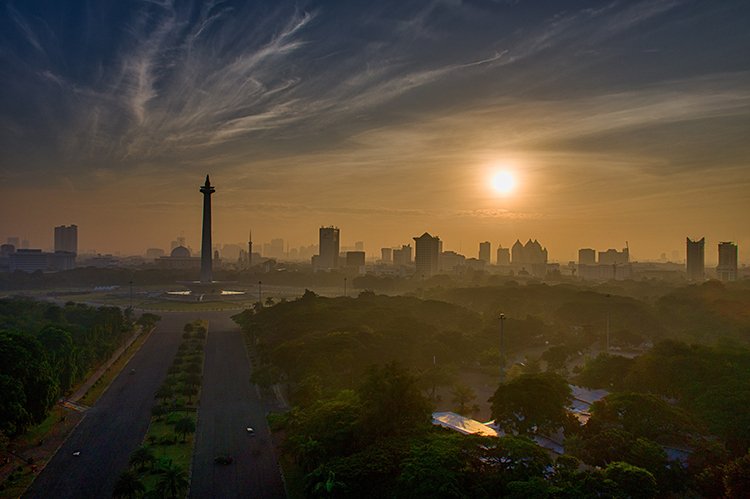
We’re about to leave the twenty-teens and embark on a journey of incredible technological and social change. For some this is an exciting and positive time to be alive and Indonesia is going to be an exciting and positive place to be.
For others though, Indonesia will never be able to match its potential and a primary reason for this is the country’s inability to attract Direct Foreign Investment, (DFI) which some claim has been on the decline.
Is Direct Foreign Investment down?
A recent article in The Jakarta Post reinforced this sentiment saying “Indonesia is struggling to attract foreign investments, which are instead going to neighboring countries such as Vietnam and Cambodia as they embark on deregulation and policy solutions, according to the World Bank.”
Yes, GDP is down reaching just 5.02 percent in Q3, the lowest level in more than two years apparently and surely investment (or lack thereof) has a big say in this.
The Business Times of Singapore however, paints a very different picture claiming “Indonesia’s investment realization of domestic and foreign direct investment accelerated in the third quarter of 2019, which “reflects confidence among investors in the Indonesian economy following the election victory of the incumbent President Joko Widodo”, UOB economists said.
The report goes on to say “overall, total investment realization grew 18.4-percent year on year, accelerating from the previous quarter’s 13.7-percent pace. Total realization of Domestic Direct Investment (DDI) rose 18.9-percent year on year to IDR 100.7-trillion, accelerating from 18.6-percent the previous quarter. Foreign Direct Investment (FDI) soared 17.8-percent to IDR 105-trillion, up from the previous quarter’s 9.6-percent rise. Singapore was the top country of origin, accounting for USD 1.9-billion or 27.1-percent of FDI realization.”
Negative Investment List
One of many reasons for this apparent lack of foreign investment has been Indonesia’s Negative Investment List (NIL). According to the Indonesian Investment Coordinating Board (BKPM) website, Indonesia’s Negative Investment List (NIL) identifies specific businesses that are off-limits for foreign investment.
Its purpose?
To protect the Indonesian economy by banning or limiting foreign investment in specific business sectors to safeguard local firms against foreign competition.
For many, this has been seen as a stumbling block for Foreign Direct Investment into the country. Smells like protectionism right?
Spoiler alert! – Indonesia is not alone
But it’s worth noting Indonesia is not alone in having a NIL, even though it may be called different names in different places.
China has one for example, so too does Vietnam, Thailand has one, Cambodia has one, the UK has one, Germany has one, ASEAN as a group has one (except for Singapore, which does not have a law on foreign investment as such). Even the United States has restrictions on foreign investment.
Admittedly, the US version of its NIL is worded in a way that’s less ‘scary’ perhaps, and more legal-doubledy-gook and yes, there aren’t as many sectors as Indonesia that are restricted, but it does have business sectors that are off limits to foreigners, plain and simple.
According to the US-China Business Council (USCBC) for example, sectors like nuclear energy, domestic air services, and bank board membership are totally off limits. This is understandable really. I mean you don’t want those pesky Russians in charge of nuclear power plants and the Saudis in charge of American Airline flights do you?
Other sectors are also limited. Some are based upon reciprocity, like rights of way for gas and oil pipelines and cable TV operations. Again that’s understandable because god forbid the Ukrainians had a say in what CNN broadcast right?
Indonesia’s bad press
So why shouldn’t Indonesia also have certain business sectors it wants to protect?
Here’s the rub on that thought, because Indonesia tends to get more than its fair share of criticism when it comes to what foreigners can or cannot invest in. I’m sure there will be voices raised against this idea because Indonesia is, well … Indonesia after all. And it doesn’t really matter what initiatives are taken to improve, they are all doomed to fail.
These self-important voices tend to ignore World Bank reports that claim Indonesia as “the largest economy in Southeast Asia, has charted impressive economic growth since overcoming the Asian financial crisis of the late 1990s. The country’s GDP per capita has steadily risen, from USD 823 in the year 2000 to USD 3,932 in 2018. … and despite heightened global uncertainty, Indonesia’s economic outlook continues to be positive, with domestic demand being the main driver of growth.”
It seems that no matter how much Indonesia tries to take steps to improve its economy and the quality of life for its 267+ million people it’s never going to be good enough for those enlightened neo-colonialists who always seem to know what’s best for someone else’s country.
Let’s be realistic
There are many reasons people have used not to invest in Indonesia; corruption, labour laws, credit ratings, education, infrastructure, red-tape, immigration, bankruptcy laws, effective enforcement of any laws actually, did we mention corruption already? And anyway, it’s way better to invest in Vietnam or Cambodia right? Amongst all of these often-valid reasons, the NIL has always been a biggie.
We’re not looking at the situation through rose-coloured glasses here, we’re just trying to be fair and whether you’re a lover or a hater you have to give Jokowi’s administration credit for at least listening to its critics and trying to improve.
Positive Investment List and the Omnibus Law
Change might not be happening as fast as some would like. It might not follow ideologies some would prefer. It might even be a little messy in parts, but Indonesia is trying, and one way this is happening is with something called the Positive Investment List (PIL), which news wires are reporting will come into play in early 2020. Using affirmative words rather than saying a revised Negative Investment List should also make people think about what the bigger message is here.
The Jakarta Post is reporting the PIL will allow the government to “begin promoting priority industries that are open to both foreign and domestic investment … aiming to reduce current account deficit, improve financial stability, and stimulate growth in Southeast Asia’s largest economy.”
So what’s going to happen to the NIL?
What the government is saying is that any sectors currently in the NIL and not specifically identified in the PIL will be covered by the much more flexible and investor friendly Omnibus Law. This has yet to be released and yes, it’s the subject of much speculation of course, but it’s already clear there have been positive steps taken in relaxing regulations around taxes and labour laws and the issuing of burdensome permits. And there’s more to come.
Those areas that will remain restricted and on the NIL will include gambling, cannabis cultivation, chemical weapons and the wildlife trade. Coordinating Economic Minister Airlangga Hartarto told reporters recently that the government will welcome investment in businesses outside of these areas. “We will draft a presidential regulation on the priority list, or the positive investment list, particularly for industries that are import-substitution or export-oriented,” he said.
The twenty-twenties is yours for the taking
For us, the bottom line is Indonesia is at the start of an exciting journey towards economic prosperity and social reform. We are under no illusion there will be problems to overcome. There always are, but focusing on these negatives does nothing to improve the situation. It might feed your ego but that’s not always a good thing to feed.
Unfortunately for every country, significant change does not happen with magic wands and rabbit hats before breakfast. It takes time, support, consistency and a clear intention to look towards the benefit of the greater good. We think this administration can do that, or at least set the groundwork for future generations to work with and we look forward to the New Year and the twenty-twenties for all the right reasons.
Sources: The Insider Stories, The Jakarta Post, White & Case, The World Bank, Business Times Singapore, BKPM
#indonesiainvestment #positiveinvestmentlist #invest2020 #omnibuslaw #sevenstonesindonesia #investindonesia

















